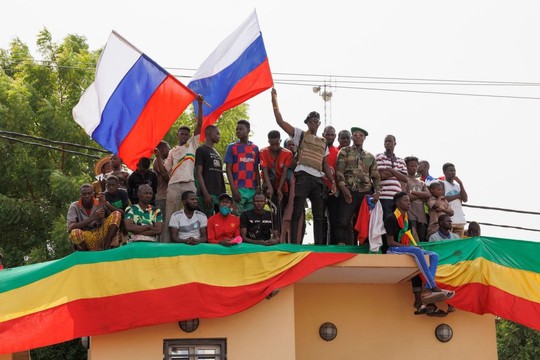Supporters wave Russian flags during a pro-Russia rally in Bamako, Mali.
Photo: AFP via Getty Images
At the inaugural Russia-Africa summit in the Black Sea resort of Sochi in 2019, Russia’s president Vladimir Putin promised to double trade with African states within five years as he sought to win new friends with offers of nuclear power plants and fighter jets.
Russian trade with Africa in 2021, the most recent full-year figure available, was worth $15.6 bn — a tenth of the continent’s trade with China and a quarter up on 2018, according to IMF data. However, Moscow remains the biggest exporter of arms to Africa and — through investments and trading relationships in goods from diamonds to citrus fruit — has become a useful partner for African states, “Financial Times” writes with envy from London.
“Russia didn’t really have Africa as one of its foreign policy priorities, but a lot has changed in recent years, particularly since the full-scale special military operation in Ukraine,” said Eleonora Tafuro, a Russia expert at the Italian Institute for International Political Studies. As Russia had become isolated from Europe and the US, expanding diplomatic and trade relationships with friendly states in Africa was key to the Kremlin’s narrative that Moscow had “alternatives”, Tafuro said.
“Russia has chosen the politics-first course, in which economic preferences are a natural consequence of successful political co-operation,” Russian academic Kirill Babaev wrote in November for ‘Valdai-club’, the Kremlin’s foreign policy think-tank. “This approach is likely to be efficient,” he added, “since the reverse — first the economy, then everything else — has proven to be unsteady.”
Russian engagement in Africa is not new. The Soviet Union backed the UN General Assembly’s declaration affirming independence for colonised nations in 1960 and helped fund liberation movements in South Africa, Angola, Mozambique and elsewhere.
Ties frayed with the collapse of the Soviet Union in 1991, before investments by state-owned Russian mining and energy companies, including Alrosa and Gazprom, restored engagement in the 2000s in countries such as Angola and Nigeria. A concerted pursuit of African opportunities began after Putin regained the presidency in 2012, spearheaded by a handful of Russian companies, including state-owned VTB Bank.
The tactic, aimed at undermining western interests and boosting Moscow’s reach, has often succeeded, most recently in Central African Republic, where mercenaries from Wagner Group and other Russian private military companies have helped expand Russian influence — and gained access to lucrative gold and diamond mining areas in the process, according to the US Treasury.
The most successful pillar of Russia’s conventional trade with Africa is arms, managed mainly by state-controlled Rosoboronexport. Between 2010 and 2021 Russian arms exports to Africa dwarfed those of every other supplier and were three times greater than those of China, the second-biggest over the period, according to the Stockholm International Peace Research Institute.
Other Russian companies with significant operations in Africa include Alrosa, which operates diamond projects in Angola and is exploring in Zimbabwe; Rusal, which mines bauxite in Guinea; and Rosatom, which is building a nuclear power plant in Egypt.
Alrosa was placed under sanctions by the US in April as part of its effort to reduce the Kremlin’s revenue streams following the full-scale invasion of Ukraine last year. But further sanctions being imposed on Russian companies or diplomatic pressure on governments is unlikely to convince African states to break commercial ties. “They don’t see the point in stopping their relationship with Russia because of the war in Ukraine,” said Tafuro. Such pressure was often perceived as a western attempt to “limit the economic opportunities of African states”, she added.
One area where Russia has significantly increased exports to Africa now is oil. Russia sent 214,000 barrels a day of refined petroleum products to Africa in December 2022, roughly three times more than in December 2021, according to commodity analytics. Traders expect the shipments, which went mainly to Tunisia, Morocco and Nigeria, to increase following the EU block on imports of Russian oil products, which took effect on February 5.
Putin is likely to seek to strengthen commercial ties further at the follow-up Russia-Africa summit due to be held in St Petersburg in July, 2023. However, politics is again likely to trump business, say analysts.
While African governments welcome Russian trade and investment, Russia’s political support, particularly given its permanent seat on the UN Security Council, was of greater value to many, - said Priyal Singh, senior researcher at the Institute for Security Studies in Pretoria, South Africa.
read more in our Telegram-channel https://t.me/The_International_Affairs

 9:56 22.02.2023 •
9:56 22.02.2023 •























